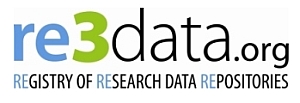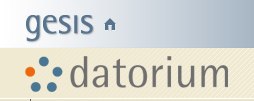Posted: March 20th, 2014 | Author: Sven | Filed under: Projects | Tags: data deposit, data repositories, DataBib, DataCite, RDM | Comments Off on re3data.org receives another two year grant #Update
 The project re3data.org has received another grant: The German Research Foundation (DFG) has extended the funding of re3data.org – a registry of research data repositories – for another two years. Congrats!
The project re3data.org has received another grant: The German Research Foundation (DFG) has extended the funding of re3data.org – a registry of research data repositories – for another two years. Congrats!
Until the end of 2015 re3data.org aims to implement new functionalities and to integrate more research data repositories. These repositories will be indexed to offer researchers, funding organizations and libraries all over the world an easy-to-use overview of the heterogeneous research data repository landscape.
Read the rest of this entry »
Posted: March 18th, 2014 | Author: Sven | Filed under: found on the net | Tags: access to data, Data Sharing, Linking Data and Publications | Comments Off on Mendeley and labfolder join forces to improve data linking and exchange
Mendeley, a desktop and web program for managing and sharing research papers recently announced a collaboration with labfolder – a Berlin-based startup. labfolder is a digital lab notebook which helps scientists to keep their notes and data organized. The linking of these two tools allows the citation and embedding of scientific literature into experimental raw data, and the exporting and sharing of experiment descriptions in Mendeley.
For those interested in labfolder, I embedded the product video below. (Sorry for the advertising. I only mention the collaboration, because it shows that data availability and interlinking data and publications gets increasingly important)
https://www.youtube.com/watch?feature=player_embedded&v=S8OCIBAfbTE
Posted: March 10th, 2014 | Author: Sven | Filed under: Data Sharing, Projects, Research Data | Tags: data repositories, Data Sharing, Datasets, DOI | Comments Off on Introducing datorium – a new Data Repository Service for the Social Sciences
 The current e-infrastructure for research data management in the field of social sciences in Germany has extended by an important component. Up to now, we faced a fragmented e-infrastructure for documenting, storing, hosting and curating research data in social sciences: On the one hand there are well-established research data centres e.g. for large household survey data. On the other hand appropriate research data infrastructure components for small and medium-sized research projects for instance were, with a few exceptions, almost not available yet. Read the rest of this entry »
The current e-infrastructure for research data management in the field of social sciences in Germany has extended by an important component. Up to now, we faced a fragmented e-infrastructure for documenting, storing, hosting and curating research data in social sciences: On the one hand there are well-established research data centres e.g. for large household survey data. On the other hand appropriate research data infrastructure components for small and medium-sized research projects for instance were, with a few exceptions, almost not available yet. Read the rest of this entry »
 The project re3data.org has received another grant: The German Research Foundation (DFG) has extended the funding of re3data.org – a registry of research data repositories – for another two years. Congrats!
The project re3data.org has received another grant: The German Research Foundation (DFG) has extended the funding of re3data.org – a registry of research data repositories – for another two years. Congrats!
 The current e-infrastructure for research data management in the field of social sciences in Germany has extended by an important component. Up to now, we faced a fragmented e-infrastructure for documenting, storing, hosting and curating research data in social sciences: On the one hand there are
The current e-infrastructure for research data management in the field of social sciences in Germany has extended by an important component. Up to now, we faced a fragmented e-infrastructure for documenting, storing, hosting and curating research data in social sciences: On the one hand there are 





